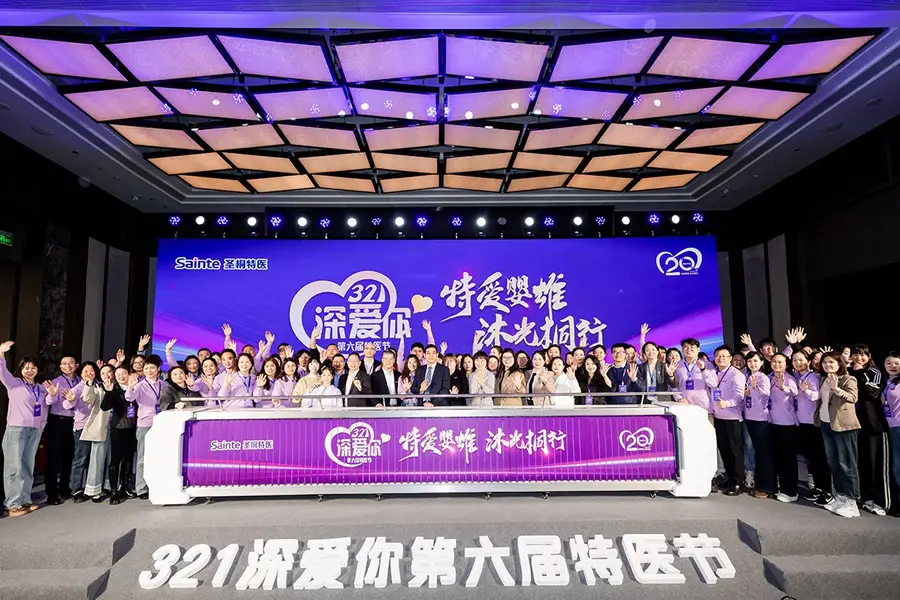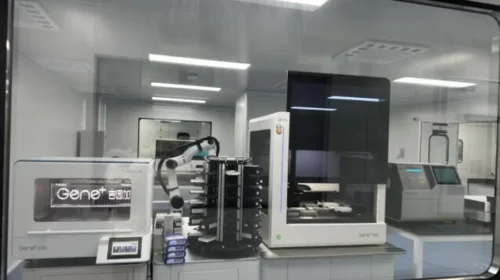Sainte Nutritional nurtures Hong Kong IPO

The Qingdao-based maker of food for special medical purposes is challenging international firms that still dominate the China market but could face tariff uncertainties
Key Takeaways:
- Sainte Nutritional has filed for a Hong Kong IPO, boasting a list of heavyweight financial backers and soaring revenue and profits
- As Chinese birthrates decline, the infant-focused maker of foods for special medical purposes is diversifying into China’s growing market for elderly nutrition
By Edith Terry
When Sainte Nutritional Inc. made its first public disclosure for a planned Hong Kong IPO last Friday, it listed Citic Securities as its main sponsor. But in an indicator of strong investor appetite for this up-and-coming maker of infant nutritional products, it revealed a short time later that CLSA would join the underwriting team as overall coordinator.
Sainte’s metrics are indeed impressive for such an old-economy company with more than two decades of history. Its revenue has almost doubled over the last three years, rising from 491 million yuan ($68.3 million) in 2022 to 834 million yuan last year. Revenue from cross-border e-commerce platforms amounted to 405.1 million yuan in 2024, making up 48.6% of its total. The company’s adjusted net profit has also grown quickly, from 120.7 million yuan in 2022 to 199.4 million yuan in 2024. And its gross margin has hovered at an enviable level of around 71% over the last three years.
Formerly known as Shengtong Nutritional Food, Sainte was one of China’s earliest entrants in the domestic market for food for special medical purposes (FSMP), specializing mainly in specialty products for infants with allergies, which accounted for 90% of its revenues in 2024.
The domestic market that still accounts for more than half of Sainte’s sales is dominated by international giants. Nestlé (NESN.SW) and Danone (BN.PA) are the country’s largest and second-largest players, respectively, followed by Sainte in third and Abbott Laboratories (ABT.US) in fourth. That makes Sainte first among its domestic peers, according to third-party research in the listing document. Only one other domestic company is in the top five, dairy giant China Feihe (6186.HK).
Feihe currently trades at a price-to-sales (P/S) ratio of 2.32, meaning Sainte could fetch a valuation of about 2 billion yuan if it can match that level, based on its 2024 sales. That could help it to raise as much as 500 million yuan, if not more, giving it funds to scale up production at a new facility currently under construction in Inner Mongolia.
The IPO marks just the latest fundraising for Sainte, which also raised 400 million yuan in a Series B round in February. It boasts an A-list of backers, including SAIC Motor’s Hengxu Capital investment arm, Hillhouse Capital, Lee Kai-fu’s Sinovation Ventures and CICC.
FSMP products require a physician’s supervision and are dominated by products for infants with special needs. In China, the penetration rate for all FSMP products is only 3%, well below the 40% rate in mature markets. According to the listing document, the Chinese market is growing 18% annually is expected to reach 53.1 billion yuan by 2029, with infant products accounting for 27.4 billion yuan, or about half the total.
The timing may be good for companies like Sainte to challenge their international peers, who could be hobbled by retaliatory tariffs from China if parts of their supply chains are based in the U.S. Sainte’s only outside supplier is in South Korea, making it relatively immune from tariff wars that only affect goods imported to China from the U.S. But that said, it sells nearly half its products overseas, mostly through e-commerce, though the listing document doesn’t specify how much, if any, goes to the U.S.
Two decades of history
Sainte’s history goes back to 2005, when it was established as the FSMP division of Shengyuan Nutritional, controlled by the husband-and-wife team Zhang Liang and Meng Xiuqing. Zhang founded Synutra International in 1998 as an infant formula maker, and the company was listed on the Nasdaq from 2007 and 2017 before Zhang took it private.
China had no domestic FSMP producers in the early 2000s, according to the listing document. As the current domestic leader in the space, Sainte now has 14 product segments and seven certified products.
The strong investor interest in Sainte seems counterintuitive given China’s rapidly declining birth rate. 2024, a Year of the Dragon on the Chinese zodiac and favored by prospective parents, saw an uptick in births to 9.5 million from 9 million in 2023, marking the highest number of annual births of any country in the world. Even so, the long-term outlook is bleak due to factors common to mature economies, including later marriages and the high costs of raising children. Sainte counters that China’s Gen Z parents are newly committed to making sure their infants have proper nutrition and are quick to buy specialty products to address any perceived disorders.
Still, Sainte realizes the demographic trends are working against it and is diversifying into products for adults to complement its current portfolio. Demand for non-infant FSMP products is expected to boom as China’s population over the age of 60 rises, already accounting for more than one-fifth of the population in 2023, based on official sources. According to Sainte’s prospectus, the market for non-infant FSMP products should grow by an average annual rate of 21.5% between 2024 and 2029, reaching 25.8 billion yuan in sales by 2029.
“Guided by our ethos of ‘Precise Nutrition, Professional Care,’ we care about the needs of special groups, from infants grappling with allergies, lactose intolerance and preterm vulnerabilities to the silver tsunami of the aging populace,” the company said in its listing document. Sainte’s 300-plus distributors sell through hospitals, postnatal care centers, specialty stores and online, with over 17,000 points of sale.
Sainte’s main manufacturing facility in the Northeastern Chinese city of Qingdao, which it shared with its parent Shengyuan Group until 2023, produced 1.7 tons of FSMP products in 2024. It opened another factory in February this year, and a third is under construction in Inner Mongolia, due to open in 2026.
The company needs to move quickly as a growing field of domestic competitors nip at its heels. The annual number of new FSMP registrations in China jumped from 13 in 2022 to 70 in 2023, and another 42 registrations were recorded last year. Domestic firms accounted for 174 out of 206 FSMP registrations in China as of Sept. 20, according to the State Administration of Market Supervision, showing local Chinese companies want to try to gain a piece of this major market.
That said, the international giants still have a huge lead. Nestlé dominates with a 57% market share, followed by Danone at 18.4%. Sainte is undoubtedly hoping to wrestle some of that away for itself, and could benefit from nationalistic elements as Chinese grow increasingly comfortable with domestic brands. That could bode well for its IPO if investors believe it looks well positioned to keep up its strong growth.
To subscribe to Bamboo Works weekly free newsletter, click here





